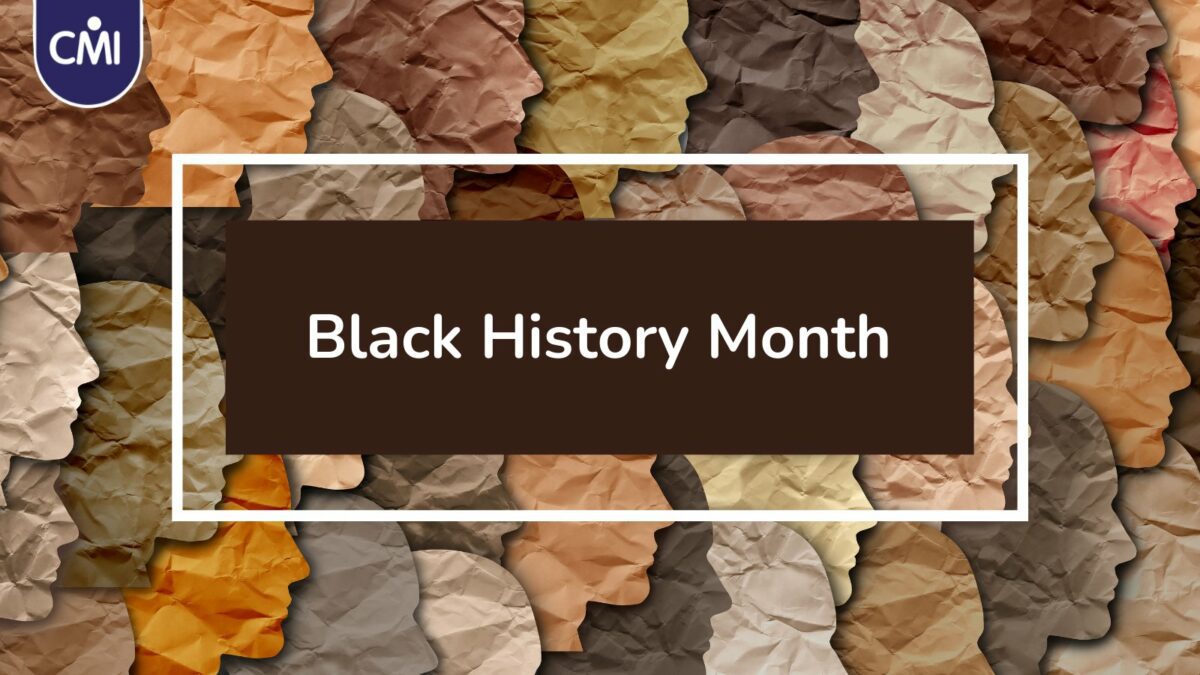Black History Month 2022: Managers and leaders need to bridge the ‘say versus do’ gap to tackle workplace disparities

Two years after Black Lives Matter, Chartered Management Institute research points to the need to offer more to deliver change – a message that resonates with the theme of this year’s Black History Month – “Time for Change: Action Not Words.”
The Black Lives Matter protests in 2020 saw many organisations commit to tackling racism – but two years later, it is time for us to ask if we are walking the walk?
Earlier in the year, CMI launched The Everyone Economy – a major project outlining our plan for sharing work, opportunity and success. We gathered evidence from CMI’s global community of managers and leaders as well as our specially-convened 75th anniversary advisory council.
Close the gaps
Our analysis identified that diverse ethnic groups make up 13% of the UK working population and 12% of UK managers – meaning we need 100,000 more managers from diverse ethnic groups to bring representation into line with the UK working population.
And these percentages mask large differences between different ethnic groups. People from Black and Pakistani backgrounds remain significantly underrepresented at senior management level:
- Those from a Black background make up 3.2% of the working population but only 1.8% of senior leaders.
- Those from a Pakistani background make up 1.3% of the working population and 0.9% of senior leaders.
Our research finds that there is still not enough concerted action taking place to close gaps in representation. We found that 88% of respondents agreed that their organisation is inclusive of all staff regardless of ethnicity but less than half of respondents (47%) said their organisation was taking active steps to increase the proportion of employees from diverse ethnic groups through its recruitment practices and 67% of respondents said their organisation was not taking any action or they did not know if their organisation was taking any action in relation to ethnicity pay gap reporting and action plans – steps that we know are important in improving transparency and accountability.
Respondents from diverse ethnic groups were also more likely than white respondents to report a lack of action in relation to ethnicity pay gap reporting (42% vs. 32%), and limited support for progression for those from diverse ethnic groups (31% vs 4%).
Maximising talent
It is concerning that minimal progress seems to have been made since we published our CMI Race research in 2020 – where we also identified an “action gap”. Back then, 85% of managers said they felt comfortable to talk about race with their team but only 34% had talked to their team about their organisation’s response to Black Lives Matter – one of the biggest and most publicised movements of racial equality in recent times.
Without action, demographic changes show the numbers of those unable to reach management level in organisations is going to grow further. Projections show that the percentage of the population from diverse ethnic groups will rise – from 15% in 2019 to 21% in 2026 and 30% by 2051.
To address the problems in our economy such as the threat of recession and productivity gaps with international competitors we need to be maximising talent in the UK economy. This means that Equality, Diversity and Inclusion isn’t just about doing what is right – it’s about realising the business and economic benefits of diverse teams, different perspectives and inclusive working cultures. Everyone needs to have the chance to make their best possible contribution and reach their maximum potential. For instance, analysis finds a productivity premium for having a more diverse workforce and suggests that increasing diversity can close productivity gaps between typical and top performing companies.
Learn what works
Whilst acknowledging the disparities that exist, we also need to realise that many employers are leading the way in delivering change and addressing inequality at work. The Everyone Economy identified a suite of case studies that managers and leaders can learn from.
To begin to tackle disparities at work you first need to be aware that a problem exists – which is why data collection is so important. For example, Shaw Trust collects both qualitative and quantitative data to assess progress and establish trends. This includes staff surveys, monitoring of the employee lifecycle, including recruitment, take up of development opportunities and progression. They actively campaign internally to encourage employees to share data and explain why it is important and how it will be used.
Organisations also need to ensure they are following up data collection with action. Gillette has representation targets at every management level and part of the performance of general managers and senior vice presidents is assessed on what progress they are making towards these targets in terms of hiring and promotion. They also have staff groups, utilise reverse mentoring and run dedicated celebration and awareness months to help build an inclusive culture and safe environment.
There will of course be specific challenges depending on the sector or size of the organisation – but practices such as benchmarking against other similar employers can help you learn about what works. The Everyone Economy has recommendations for both SMEs and larger organisations.
There is a role for the government in spreading best practice and ensuring employers take action. This needs to include a widespread and consistent commitment to identifying and tackling discrimination at all levels, alongside improved regulatory and reporting requirements such as ethnicity pay gap reporting and mandatory action plans.
There is no silver bullet to addressing disparities at work – it requires a deliberate and concerted effort from managers, leaders and governments. But by spreading best practice and learning from others we can start delivering real action – not just words.
By Jules Bennington, Policy & Innovation Officer at Chartered Management Institute (CMI)












Responses